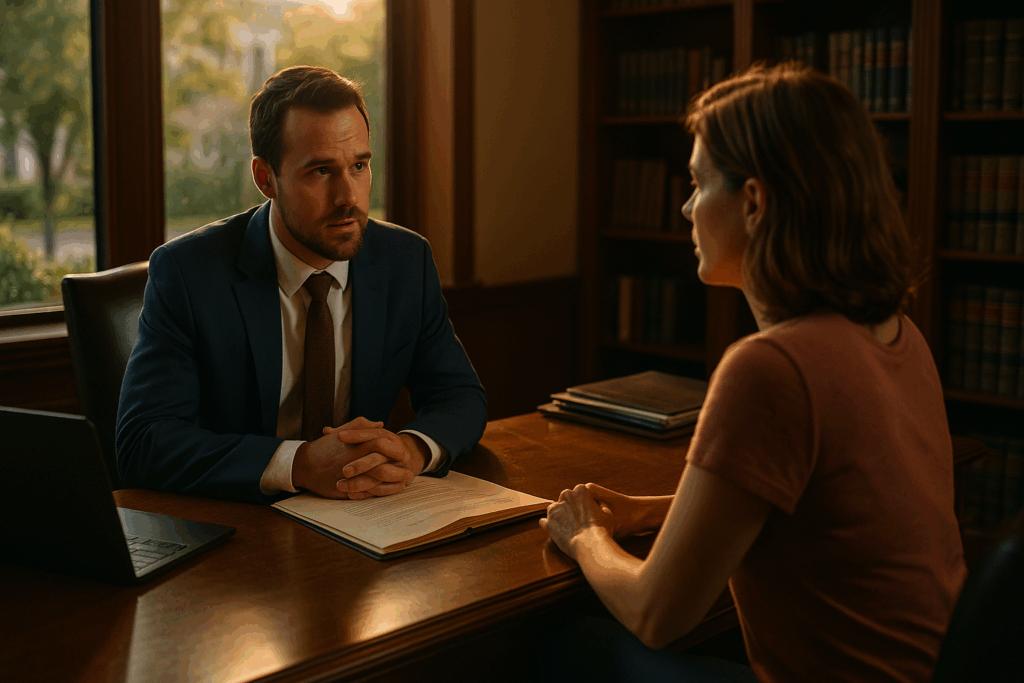
Ever tried splitting up family game night when the kids can’t agree on which board game to play? One wants Monopoly, the other insists on Uno, and suddenly you’re the judge, referee, and peace negotiator all rolled into one. Now take that same tug-of-war and multiply it by a thousand—that’s what custody disputes can feel like. And it’s exactly why parents often ask: How Do Previous Client Outcomes Reflect the Effectiveness of Texas Child Custody Lawyers?
Here’s the truth: those past outcomes are like a sneak peek into how an attorney handles conflict, compromise, and ultimately, the well-being of children. The best lawyers aren’t just focused on “winning”; they’re focused on creating solutions that actually work for families in the long run. A good outcome is one that gives kids stability, parents clarity, and families a foundation to move forward without constant battles.
In this blog, we’ll walk through how courts in Texas look at custody outcomes, why some lawyers’ past cases reveal more than flashy promises ever could, and how smart legal strategies can ease emotional strain during family transitions. We’ll also share real stories, legal insights most parents don’t know, and practical tips you can start applying today—whether it’s building consistency across households, communicating with co-parents, or knowing when to bring in professional support. At The Law Office of Bryan Fagan, PLLC, our mission has always been clear: to educate families and protect futures, one custody outcome at a time.
Key Takeaways
- Positive client outcomes in custody cases directly contribute to the emotional well-being and stability of children, emphasizing the importance of favorable legal representation.
- Effective custody arrangements prioritize the child’s best interests, ensuring stability and strong relationships with both parents while accommodating their emotional and educational needs.
- Strong communication, negotiation skills, and a deep understanding of Texas family law are essential for attorneys to achieve favorable outcomes in child custody cases.
Importance of Client Outcomes in Child Custody Cases
Positive outcomes in child custody cases are never just about winning in court; they represent a turning point in a child’s stability, emotional well-being, and family life. How Do Previous Client Outcomes Reflect the Effectiveness of Texas Child Custody Lawyers? As our attorneys frequently advise, a strong result in custody litigation or negotiation often means reduced stress for parents and children, smoother transitions between households, and fewer disruptions in the routines that give children a sense of security. Under Texas Family Code §153.002, the best interest of the child is the controlling standard, and favorable outcomes reflect an attorney’s ability to align legal advocacy with this guiding principle.
Custody arrangements directly shape a child’s future. When properly crafted, they preserve relationships with both parents, maintain consistency in daily life, and ensure emotional and physical needs are met. According to our family law team, this level of stability supports not only a child’s development but also long-term family harmony. The most effective lawyers use parenting plans, possession schedules, and conflict-resolution tools to foster continuity and reduce the risk of recurring disputes, which is especially critical under the updated provisions of the Texas Family Code addressing co-parenting and conservatorship.
As we’ve seen in our work with Texas families, gratitude from parents during custody disputes is less about courtroom battles and more about knowing their lawyer secured a plan that truly protects their child. Our legal professionals have helped many clients understand that effective advocacy is about more than legal paperwork—it’s about building trust, offering steady guidance during turbulent times, and ensuring the outcome reflects a child-centered approach. For parents facing both custody and financial concerns, resources like our Kingwood Texas Child Support Attorney page explain how support obligations work hand in hand with custody to promote children’s stability.
At The Law Office of Bryan Fagan, PLLC, we believe education is empowerment. If you’d like to explore more on this topic, we invite you to read our article on Child Custody in Texas, which breaks down common challenges and strategies parents can use to protect their children during divorce or separation. As always, our mission is to educate families and protect futures—one case, and one child, at a time.

Defining a Meaningful Client Outcome in Child Custody Cases
A meaningful client outcome in child custody cases is one that prioritizes the child’s best interests, promoting stability and continuity in their life. Stability is a cornerstone for a child’s well-being, providing them with a sense of security that is crucial for their emotional and psychological health. When child custody arrangements are designed with these principles in mind, they foster strong parent-child relationships that are vital for children’s lives and development, taking into account the child’s preference and child support. This stability ultimately plays a significant role in a child’s life.
Meaningful outcomes also consider the child’s relationship with both parents, ensuring that they have the support and love they need from both sides. Whether it’s joint custody or a well-thought-out visitation schedule, the focus should always be on what will best serve the child’s welfare. Attorneys who prioritize the child’s needs can create custody arrangements that bolster the child’s emotional well-being and overall stability.
Anticipating Conflicts and Crafting Lasting Parenting Plans
Anticipating conflicts and building durable parenting plans are cornerstones of effective child custody representation. How Do Previous Client Outcomes Reflect the Effectiveness of Texas Child Custody Lawyers? As our attorneys frequently advise, the ability to foresee areas of tension and proactively design solutions is often the difference between a family caught in constant disputes and one that can move forward with stability. Under Texas Family Code §153.002, every custody decision must prioritize the best interest of the child, and the latest updates to the Code emphasize the importance of minimizing disruption in children’s lives through thoughtful parenting arrangements.
According to our family law team, effective parenting plans go beyond visitation schedules. They ensure stability in a child’s living environment, reinforce consistent routines like school and extracurriculars, and establish clear steps for resolving disagreements before they escalate. By incorporating dispute resolution methods—and in some cases, appointing a parenting coordinator under Texas Family Code §153.601 et seq.—families are better positioned to avoid costly, stressful litigation and instead focus on cooperative parenting that protects the child’s well-being.
As we’ve seen in our work with Texas families, strong negotiation skills and consistent communication between attorney and client are critical. Our legal professionals have helped many clients understand that the true success of a parenting plan lies not only in what is written today but also in how well it withstands future challenges. When lawyers anticipate conflicts and create parenting plans that endure, they produce outcomes that reflect real effectiveness and long-term stability for children.
For families also facing CPS-related concerns, our firm provides resources to explain how investigations and custody issues intersect. You can learn more through our guide on CPS Investigation Outcomes, which highlights how proactive planning and skilled advocacy can safeguard parental rights and protect children. Additional resources on child custody in Texas are available to support parents navigating these complex decisions.
At The Law Office of Bryan Fagan, PLLC, our mission remains the same: to educate families and protect futures. By prioritizing proactive parenting plans, collaborative resolutions, and the child’s best interests as outlined in the Texas Family Code, we help families build a foundation for security, trust, and lasting peace of mind.

Factors Contributing to Strong Client Outcomes
Several factors contribute to strong client outcomes in child custody cases:
- A lawyer’s ability to navigate the complexities of Texas family law is paramount.
- Their expertise in understanding the intricacies of family law can significantly influence the outcome of custody cases.
- Assessing an attorney’s past successes and their overall win rate in similar cases can provide valuable insight into their effectiveness.
Other critical factors include effective communication and negotiation skills, as well as a deep understanding of the child’s needs. Each of these elements plays a vital role in securing favorable outcomes and ensuring that the child’s best interests are prioritized throughout the legal process.
Legal Knowledge and Experience
Legal knowledge and hands-on experience form the foundation of effective child custody advocacy. How Do Previous Client Outcomes Reflect the Effectiveness of Texas Child Custody Lawyers? As our attorneys frequently advise, the results of past cases often reveal whether a lawyer not only understands the law but also knows how to apply it strategically in real-world family disputes. Under Texas Family Code §153.002, the “best interest of the child” remains the controlling standard, and the most recent updates to the Code highlight the importance of crafting custody arrangements that support both stability and healthy parent-child relationships.
According to our family law team, effective representation requires more than simply citing the law—it means having deep familiarity with conservatorship provisions, possession schedules, and decision-making authority under Texas Family Code Chapter 153. Attorneys with extensive experience in Texas custody cases know how to navigate complex issues such as modifications, relocation, or conflicts between joint managing conservators. This expertise directly impacts outcomes by ensuring that parenting plans not only meet legal requirements but also reflect each child’s emotional, educational, and developmental needs.
Our legal professionals have helped many clients understand that evaluating an attorney’s track record is as important as assessing their legal knowledge. A lawyer with demonstrated success in negotiating parenting plans, resolving high-conflict disputes, or securing favorable court rulings can make the difference between ongoing conflict and long-term stability. For parents seeking additional guidance, our resource on Texas Child Custody Attorneys explains how skilled representation safeguards children’s futures.
At The Law Office of Bryan Fagan, PLLC, we remain committed to educating families and protecting futures. For more insights into custody and parenting arrangements, we encourage you to visit our child custody blog resources, where our attorneys share practical tips and legal strategies that have helped countless Texas families navigate these deeply personal matters with clarity and confidence.
Effective Communication and Negotiation Skills
Clear communication and strong negotiation are often the keys to achieving meaningful results in custody cases. How Do Previous Client Outcomes Reflect the Effectiveness of Texas Child Custody Lawyers? As we’ve seen in our work with Texas families, past outcomes often demonstrate whether an attorney has the skill to foster cooperation, resolve disputes without unnecessary litigation, and keep the child’s best interests at the center of every decision. Under Texas Family Code §153.002, the “best interest of the child” remains the primary standard, and recent updates to the Code underscore the importance of co-parenting solutions that minimize conflict while supporting children’s stability.
According to our family law team, negotiation is not simply about compromise; it is about crafting parenting plans and conservatorship agreements that reflect the realities of a child’s daily life. Attorneys who communicate clearly with their clients—and effectively with opposing counsel—can often reach settlements that reduce emotional strain and avoid costly court battles. Families benefit from attorneys who listen carefully, explain legal options in plain language, and design strategies that align with the child’s needs and each parent’s capacity to provide care.
Our legal professionals have helped many clients understand that when lawyers demonstrate empathy, transparency, and professionalism, parents feel more secure and supported throughout the process. These qualities are consistently reflected in client testimonials, where parents highlight how effective communication made them feel informed and reassured. For parents wanting to explore this further, our guide on Texas Child Custody Laws: What Parents Need to Know offers additional insight into custody standards and parenting arrangements under the current Texas Family Code.
At The Law Office of Bryan Fagan, PLLC, our mission is to educate families and protect futures. For more guidance on custody-related issues, we invite you to visit our child custody resources, where our attorneys share practical strategies and compassionate advice to help Texas parents move forward with confidence.
Understanding the Child’s Needs
Understanding the child’s needs is a fundamental aspect of formulating effective custody arrangements. Recognizing and addressing a child’s emotional and educational requirements, including the child’s education, are essential in ensuring their emotional support and child’s well being. Primary physical custody arrangements must prioritize the child’s primary residence, child’s emotional well being, educational, and child’s physical well-being to support their stability and growth, as well as the child’s welfare, child’s upbringing, child’s safety, and child’s wishes.
The child’s relationship with each parent is also a critical factor. Evaluating the involvement of only one parent and stability in the child’s life helps in creating custody plans that are in the child’s best interests. Attorneys who focus on child-centered legal strategies ensure that the child’s relationship needs and preferences are prioritized in all determining custody arrangements and custody decisions in a child custody case, especially for non custodial parents. The custodial parent child relationship is essential in these considerations.
Practical Advice for Evaluating Child Custody Attorneys
Evaluating a child custody attorney begins with understanding how they have guided other families through similar challenges. How Do Previous Client Outcomes Reflect the Effectiveness of Texas Child Custody Lawyers? As we’ve seen in our work with Texas families, past results often reveal whether an attorney consistently prioritizes the child’s best interest as required by Texas Family Code §153.002, while also demonstrating skill in negotiation, courtroom advocacy, and long-term planning. Reviewing an attorney’s case history helps set realistic expectations and offers a valuable preview of how your own matter may be handled under the latest updates to the Code.
During an initial consultation, it is wise to ask about an attorney’s typical outcomes in custody disputes, including whether they have secured stable parenting plans, successfully negotiated joint managing conservatorships, or effectively handled modifications. According to our family law team, these conversations provide clients with clarity about strategies and highlight whether the attorney understands the importance of minimizing disruption in a child’s life.
Our legal professionals have helped many clients understand that effectiveness goes beyond courtroom victories. Client testimonials, peer endorsements, professional awards, and even published case outcomes all contribute to assessing whether an attorney is both trusted and respected in the family law community. For example, when analyzing provisions such as the right of first refusal—which determines how parents handle childcare during their own periods of possession—an attorney’s past success in securing workable clauses can be an indicator of skill. You can learn more about how Texas approaches this issue compared to other states in our detailed resource on comparing first right of refusal clauses.
At The Law Office of Bryan Fagan, PLLC, our mission is clear: to educate families and protect futures. By guiding clients through questions that matter, such as attorney track record and reputation, we empower parents to choose legal representation that not only resolves disputes but also safeguards a child’s emotional, academic, and developmental well-being. For additional guidance, we invite you to visit our child custody blog resources, where we continue to share insights that support Texas families navigating these important decisions.

Reviewing Client Testimonials and Endorsements
When evaluating a child custody attorney, consider the following valuable resources:
- Client testimonials and endorsements
- Awards and recognitions, which provide insight into an attorney’s reputation and effectiveness in handling child custody cases
- Professional awards, which enhance an attorney’s credibility and indicate their standing in the legal community
Exploring both client testimonials and professional recognitions provides a well-rounded view of an attorney’s capabilities. Encouraging the evaluation of testimonials and awards can help in choosing an effective attorney who is well-regarded by both clients and peers. This comprehensive approach ensures that you select an attorney capable of achieving favorable outcomes in your custody case.
Inquiring About Typical Outcomes During Consultations
During initial consultations, inquiring about an attorney’s typical outcomes can provide valuable insight into their effectiveness and approach. Understanding typical outcomes helps clients gauge an attorney’s effectiveness and the possible trajectories of their case. This knowledge is crucial for setting realistic expectations and ensuring that you are prepared and confident going into custody hearings.
The firm’s legal professionals guide clients through the preparation process, ensuring they understand the complexities of custody evaluations and how to present their cases effectively. This proactive approach helps in building a strong case and achieving favorable outcomes.
How The Law Office of Bryan Fagan, PLLC Embodies Effective Outcomes
Compassion and transparency remain at the heart of effective representation in family law. How Do Previous Client Outcomes Reflect the Effectiveness of Texas Child Custody Lawyers? According to our family law team, positive outcomes demonstrate not only courtroom skill but also an attorney’s ability to reduce stress for parents, prioritize the child’s best interests as required under Texas Family Code §153.002, and create long-term stability through carefully crafted parenting arrangements. These results often come from strategies that balance legal advocacy with empathy, ensuring families feel supported through every stage of the process.
Our legal professionals have helped many clients understand that effectiveness also lies in collaboration. Attorneys frequently work alongside mental health professionals to address a child’s emotional and psychological needs during custody disputes. This holistic approach—supported by the latest updates to the Texas Family Code—ensures custody arrangements reflect not just legal rights but also a child’s overall well-being. Whether the case involves sole managing conservatorship, joint managing conservatorship, or modifications, effective advocacy builds durable outcomes that foster stability and healthier family dynamics.
As we’ve seen in our work with Texas families, transparency in billing practices and consistent communication with clients are just as important as legal victories. These qualities build trust and help reduce anxiety during an already challenging season. Real client testimonials highlight how tailored strategies and compassionate guidance have resulted in custody arrangements that not only meet legal standards but also align with children’s emotional and developmental needs.
At The Law Office of Bryan Fagan, PLLC, our mission has always been to educate families and protect futures. For parents navigating custody disputes, we encourage exploring resources like what not to say during marriage counseling to better understand how communication and cooperation affect family outcomes. Additional insights are also available in our child custody blog library, where our attorneys share practical strategies to help Texas parents move forward with confidence.

Conclusion:
When it comes to child custody, the real measure of success isn’t a legal victory on paper—it’s whether families can move forward with less conflict and children can feel secure in their day-to-day lives. Previous client outcomes give you a window into how effective a lawyer truly is, because they reveal more than courtroom skills; they show how well an attorney balances strategy with compassion and protects what matters most: your family’s future.
If you’re facing custody questions right now, remember—you don’t have to figure this out alone. The choices you make today will shape your child’s tomorrow, and having a knowledgeable, steady advocate in your corner can make all the difference. At The Law Office of Bryan Fagan, PLLC, our team is here to guide you with both legal experience and genuine care, so you feel supported every step of the way.
So take a moment to think about what a “good outcome” looks like for your family. Is it peace of mind? A consistent routine? Maybe even fewer arguments about who gets the dog on weekends? Whatever it is, we’re ready to help you work toward it. Because for us, it’s never just about the case—it’s about protecting your children, your stability, and your future.
Texas Child Custody – Frequently Asked Questions
What is the biggest mistake in custody battle?
Focusing on “winning” instead of the child’s best interests. Judges in Texas weigh stability, safety, and co-parenting. Disparaging the other parent, violating temporary orders, withholding parenting time, or ignoring the child’s medical and daily needs can seriously harm your case and your credibility.
Who wins most child custody cases in Texas?
Texas favors Joint Managing Conservatorship (shared decision-making) unless evidence shows it would harm the child. Rather than one parent “winning,” courts craft parenting plans that serve the child’s best interests; one parent may be given the right to designate the primary residence based on caregiving history, stability, and the child’s needs.
What do judges look for in child custody cases in Texas?
Judges look for what best serves the child—safety and stability, each parent’s caregiving track record, ability to meet physical and emotional needs, willingness to encourage the child’s relationship with the other parent, the quality of each home environment, and any risks such as abuse, neglect, substance misuse, or family violence.
What looks bad in a custody battle?
Withholding the child, violating orders, chronic lateness to exchanges, hostile or profane messages, exposing the child to conflict, substance misuse, unsafe or unstable housing, interfering with therapy or medical care, and reckless social media posts can all undermine your case.
What not to say during a custody battle?
Avoid threats, insults, and absolutes like “You’ll never see the kids again.” Don’t discuss adult disputes with the child or exaggerate. Keep communication brief, polite, and fact-based; assume anything you write could be reviewed by the court.
What is the malicious parent syndrome?
It’s not a medical diagnosis or a Texas legal term. It’s a lay description of a parent who intentionally harms the child’s relationship with the other parent—through false allegations, sabotaging visitation, or persistent disparagement. Courts treat such behavior as harmful to the child and contrary to the child’s best interests.
What would cause a mother to lose custody in Texas?
Texas applies the same best-interest standard to all parents. Evidence of abuse or neglect, family violence, substance misuse, significant interference with the other parent’s rights, repeated order violations, untreated safety risks, or an inability to meet the child’s needs can lead the court to restrict or deny primary custody.
What are the 12 best interest factors in child custody?
Texas does not have a fixed statutory list of 12 factors. Courts apply the best-interest standard and often reference the Holley factors from Texas case law: the child’s desires; emotional and physical needs now and in the future; emotional and physical danger; parental abilities; programs available to assist; plans for the child; stability of each home; acts or omissions that indicate an improper relationship; and any excuses for those acts. Judges may also consider co-parenting, continuity of care, and support for the child’s routines.
How often do dads get full custody in Texas?
There’s no single percentage. Full custody for fathers is granted when the facts show it is in the child’s best interests—often tied to caregiving history, availability, stability, and safety. Many cases result in joint conservatorship with a possession schedule tailored to the child.




